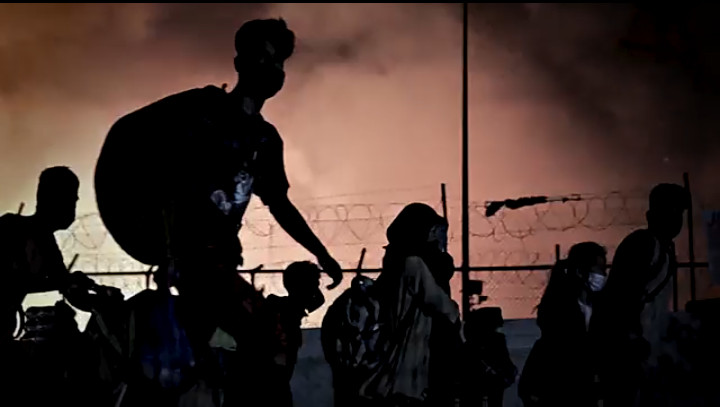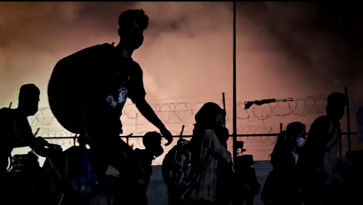Popular Reads
Top Results
Can't find what you're looking for?
View all search resultsPopular Reads
Top Results
Can't find what you're looking for?
View all search resultsIOM, Hinterhov help Afghan refugees share their lives on screen
A documentary filmmaking workshop run by the International Organization for Migration (IOM) and Surabaya's Hinterhov production house are giving Afghan refugees a medium for sharing their journeys and lives on screen.
Change text size
Gift Premium Articles
to Anyone
 A still shows a scene from a documentary by Amanullah's team, a refugee taking part in the documentary filmmaking workshop in the Riau Islands run by the International Organization for Migration (IOM) and Hinterhov, a Surabaya production house. The film, which is currently in production, is to be submitted to the IOM's Global Migration Film Festival. (JP/Courtesy of International Organization for Migration)
A still shows a scene from a documentary by Amanullah's team, a refugee taking part in the documentary filmmaking workshop in the Riau Islands run by the International Organization for Migration (IOM) and Hinterhov, a Surabaya production house. The film, which is currently in production, is to be submitted to the IOM's Global Migration Film Festival. (JP/Courtesy of International Organization for Migration)
"I wanted to adapt an old Persian poem that tells the story of Simorgh," said Shahriar Amin Nassiry, a 27-year-old refugee from Afghanistan who has been living in Indonesia for about three years.
Shahriar, like the other refugee filmmakers interviewed here, is in the middle of producing his documentary in collaboration with the International Organization for Migration (IOM) and Surabaya production house Hinterhov, which are slated to be part of a group submission to a film festival.
“Simorgh” is a well-known folk story in West and South Asia that tells of a group of birds in ancient times on a quest to seek enlightenment from the wise Bird King Simorgh. Beset by uncertainty, thirst, hunger and death, some of the birds decide to take a rest, while others give up and go home.
The remaining birds soon arrive at a mountain in what is supposed to be Simorgh's kingdom, but find nothing, only rocky cliffs and a spring. Exhausted, the birds drink from the spring. Seeing their faces reflected in the water’s surface, they come to realize that the “king of birds” is none other than themselves and attain enlightenment at the end of their journey.
“I think the story is similar to our story as refugees. Some decide to stay in transit, [some] return to [Afghanistan], and some continue their journey to the country we are heading to,” said Shahriar who, like the other interviewees, prefers not to disclose his precise location in the Riau Islands.
He added that he was making a documentary film using Persian poetry to illustrate the refugees' stories and daily activities, calling it a “generic version of Forough Farrokhzad's The House is Black”, which had influenced his perception of the “journey and choices” his protagonists made.
Shahriar was referring to the Iranian poet and film director’s acclaimed short documentary of 1962, which uses Persian poetry and Quranic verses to tell the story of the Babaghi leper colony in Tabriz, Azerbaijan.


















